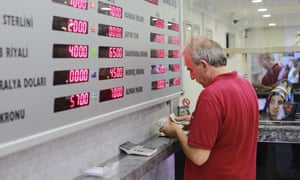Turkey's crisis could widen, and its options are running out
Erdoğan or the central bank have days to prevent a tsunami of selling and a collapse of the lira
The financial crisis a decade ago struck at the very heart of the global economy – the strategically important banks in the United States and Europe. But it took time to arrive. The “big one” of 2008 followed a series of mini-crises elsewhere in the world.
Over a 15-year period, problems in the emerging markets worked their way to the heart of the international system. Mexico, Thailand, Indonesia, South Korea, Brazil, Russia and Argentina were all warning signs that unchaining global finance would eventually prove costly to the rich developed countries as well. Unfortunately, the warning signs were ignored.
That’s why Turkey matters. The recovery from the recession 10 years ago has been patchy. Trade tensions have been rising. Reform of the financial system has been incomplete. For the time being, Turkey looks like a localised crisis with no significant spillover effects. It has the potential to be more serious than that.
For a start, it is a relatively big country, with a population of 80 million and an economy four times as big as neighbouring Greece. Turkey’s geopolitical significance extends beyond the fact that it straddles Europe and Asia. As a member of Nato, it has traditionally been seen as part of the west’s defence against Russian expansionism. It is also currently the home to 3 million Syrian refugees, many of whom would like to be living in the European Union.
What’s more, its problems – while acute – are not unique. Many emerging market economies borrowed heavily in dollars when American interest rates were at rock-bottom levels. The result was credit-driven growth, which starts to look fragile when – as now – the Federal Reserve is raising interest ratesand the dollar is strengthening.
Turkey, though, is in a class of its own. An economic and financial crisis that has been brewing all year has finally come to a head. Inflation has hit 15% and will inevitably be pushed higher because the lira is in free fall, dropping 14% on Friday alone. As Capital Economics have noted, when the rouble fell by a similar amount in 2014, the Russian central bank responded by raising interest rates by 6.5 percentage points and announced measures to support the banking system.
Russia had learnt lessons from its previous crisis, not least the need for ample foreign currency reserves to help defend the exchange rate. Turkey does not have deep pockets and has a president, Recep Tayyip Erdoğan, who has decided that the conventional response to a plunging currency – higher interest rates – is not for him.
Erdoğan is one of the world’s current crop of self-styled strongmen leaders but has the misfortune to come up against someone who is a lot stronger than he is. Relations between Turkey and the US are not good. The White House is unhappy that Erdoğan has put in an order with Vladimir Putin to buy Russian rather than American missiles. When Donald Trump announced economic sanctions against Iran last week, Erdoğan pointedly refused to take part. And, so far, Turkey has refused to release an American pastor, Andrew Brunson, held on disputed terrorism charges.
Trump chose his moment well. On Friday, when Turkey was in chaos, he announced that he was doubling tariffs on imported steel and aluminium, vital to the Turkish economy. Talk about kicking someone when they are down.
Erdoğan has insisted that he will not be browbeaten into submission but has few realistic options. To be sure, Turkey can seek to put pressure on Trump by saying that it will quit Nato and forge closer ties with Russia. Erdoğan could warn the EU that it will face a new inflow of migrants unless it intervenes on his behalf.
But what the financial markets are looking for are not diplomatic moves that demonstrate Turkey’s geopolitical importance but rather economic measures to prevent a potentially ruinous tsunami of selling over the coming days. In that respect, failure to tackle the signs of trouble earlier will now prove costly.
Erdoğan’s answer to the financial crisis – that his followers should do their patriotic duty and exchange rapidly appreciating US dollars for ever-more worthless Turkish lira – is laughable. Indeed, it will merely add to the belief in the world’s financial markets that Turkey is being led by a man who has lost touch with reality.
It is clear what needs to happen. Turkey has to tackle the three causes of its current predicament: an overheating economy; Erdoğan’s attempts since his re-election in June to prevent the central bank from taking the necessary action to deal with rising prices; and the stand-off with the US.
For Erdoğan, that means eating a huge plateful of humble pie. He is going to have to surrender to Trump over Brunson, because he is damaging the economy by continuing with a fight he cannot win. And he will need to accept that tough and unpopular measures are now inevitable to prevent a total collapse in the currency leading to hyper-inflation.
Interest rates are already at 17.75%, but with inflation poised to go to 20% over the coming months, are nowhere near high enough to put a floor under the lira.
Judging by his actions so far, Erdoğan’s next move will be to impose capital controls. However, as Paul Greer of Fidelity International notes, Turkey is a relatively open economy and requires a large amount of finance from overseas. Capital controls would not work on their own and would need to be supplemented by a rescue package from the International Monetary Fund.
It’s either that, though, or a display of shock and awe from the central bank. Turkey is running out of options and running out of time. And that should be a concern for all of us.
www.theguardian.com
12/08/2018


Aucun commentaire:
Enregistrer un commentaire